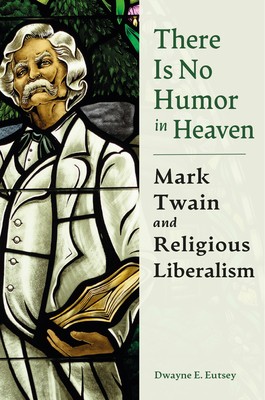
- We will send in 10–14 business days.
- Author: Dwayne E Eutsey
- Publisher: University of Missouri Press
- ISBN-10: 0826223265
- ISBN-13: 9780826223265
- Format: 15.7 x 23.5 x 3.6 cm, kieti viršeliai
- Language: English
- SAVE -10% with code: EXTRA
Reviews
Description
More than a century after his death in 1910, Mark Twain remains a lightning rod for controversy. Especially in matters of race, class, and gender, the volatile views this iconic American author expressed in classics like Adventures of Huckleberry Finn continue to provoke heated debate among antagonistic culture-war factions. However, when citing his withering attacks on religion, believers and atheists alike are often united in concluding that Twain was either a mocking skeptic or a hostile atheist.
In There is No Humor in Heaven, Dwayne Eutsey challenges the persistent view of Twain as a hostile critic of religion by placing him within the prevailing liberal religious ethos of his time. From Hannibal to the western frontier and from Hartford to the wider world, Eutsey contends Twain's vocation as a humorist was rooted in his frustrated youthful ambition to become a preacher of the Gospel. Throughout his life, his friendships with several influential liberal ministers, each of them espousing various forms of the era's diverse progressive theology, informed not only Twain's evolving religious worldview but his lecture performances and literary output. There is No Humor in Heaven traces unconventional theological influences on Twain ranging from African-American spirituality, Freemasonry, and frontier Unitarianism to devout Liberal Christianity, radical Free Religion, and esoteric Hinduism. Building on these eclectic influences, Eutsey's positive reexamination of Twain's "dark" writings late in life, such as the Mysterious Stranger documents, also draws from books Twain read as well as from personal notes of the late scholar John Tuckey, who was researching an unfinished book that reconsidered the spiritually creative vitality of Twain's supposedly pessimistic final years.EXTRA 10 % discount with code: EXTRA
The promotion ends in 22d.11:54:46
The discount code is valid when purchasing from 10 €. Discounts do not stack.
- Author: Dwayne E Eutsey
- Publisher: University of Missouri Press
- ISBN-10: 0826223265
- ISBN-13: 9780826223265
- Format: 15.7 x 23.5 x 3.6 cm, kieti viršeliai
- Language: English English
More than a century after his death in 1910, Mark Twain remains a lightning rod for controversy. Especially in matters of race, class, and gender, the volatile views this iconic American author expressed in classics like Adventures of Huckleberry Finn continue to provoke heated debate among antagonistic culture-war factions. However, when citing his withering attacks on religion, believers and atheists alike are often united in concluding that Twain was either a mocking skeptic or a hostile atheist.
In There is No Humor in Heaven, Dwayne Eutsey challenges the persistent view of Twain as a hostile critic of religion by placing him within the prevailing liberal religious ethos of his time. From Hannibal to the western frontier and from Hartford to the wider world, Eutsey contends Twain's vocation as a humorist was rooted in his frustrated youthful ambition to become a preacher of the Gospel. Throughout his life, his friendships with several influential liberal ministers, each of them espousing various forms of the era's diverse progressive theology, informed not only Twain's evolving religious worldview but his lecture performances and literary output. There is No Humor in Heaven traces unconventional theological influences on Twain ranging from African-American spirituality, Freemasonry, and frontier Unitarianism to devout Liberal Christianity, radical Free Religion, and esoteric Hinduism. Building on these eclectic influences, Eutsey's positive reexamination of Twain's "dark" writings late in life, such as the Mysterious Stranger documents, also draws from books Twain read as well as from personal notes of the late scholar John Tuckey, who was researching an unfinished book that reconsidered the spiritually creative vitality of Twain's supposedly pessimistic final years.

Reviews